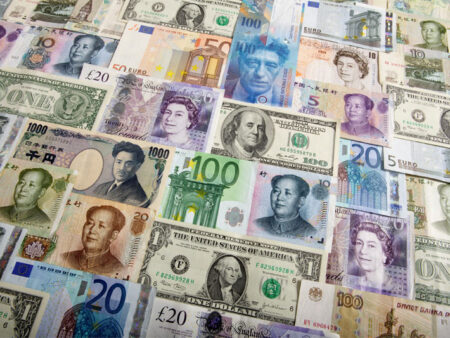By Hannah Lang
NEW YORK (Reuters) -The yen dropped on Wednesday after an influential Bank of Japan official played down the chances of a near-term rate hike, soothing investors’ concerns that a further jump in the Japanese currency could again rock global markets.
The yen fell about 2.5% to a session low of 147.94 per dollar following the comments from BOJ Deputy Governor Shinichi Uchida. The dollar was last up 1.74% at 146.850 yen.
“As we are seeing sharp volatility in domestic and overseas financial markets, it’s necessary to maintain current levels of monetary easing for the time being,” Uchida said.
His remarks, which contrasted with Governor Kazuo Ueda’s hawkish comments made last week when the BOJ unexpectedly raised interest rates, sent Japanese stocks higher, leaving them effectively flat for the week.
The BOJ’s hike last week, along with intervention from Tokyo in early July, led investors to bail out of once-popular carry trades in which traders borrow the yen at low rates to invest in assets that offer higher returns.
The carry unwind combined with weak U.S. jobs data and fears about an artificial intelligence bubble to send global stocks tumbling this week, started by a 12% crash in Japanese equities on Monday.
“I think we’re still going through a little bit of an unwind from what was, at least thematically from a market perspective, a little bit of an overreaction,” said Marvin Loh, senior global macro strategist at State Street (NYSE:) in Boston.
The , which measures the currency against six rivals, rose 0.214% to 103.2, inching further above the seven-month low of 102.15 it touched on Monday.
“The drama – the sturm und drang – of these kind of moves in equities are great stories, but they don’t necessarily… signal a greater economic catastrophe. I just don’t see it,” said Joseph Trevisani, senior analyst at FX Street in New York.
CARRY TRADES
The yen’s decline was broad based, with the Mexican peso, New Zealand dollar and Australian dollar – all carry trade investment candidates – surging against the currency.
The Swiss franc, another currency that was used to fund carry trades, like the yen, was down around 1.18% to 0.862 per dollar.
The euro was down 0.09% at $1.092, below an eight-month high of $1.101 hit on Monday as the dollar dropped. Sterling was 0.06% lower at $1.268.
Traders ramped up their bets on Federal Reserve rate cuts on Monday following an unexpected jump in the unemployment rate on Friday, at one point pricing in more than 125 basis points of reductions this year.
Those bets have gradually come down, and traders on Wednesday were expecting 100 bps of easing this year and a 62% chance of a 50 basis point cut in September, having priced it as a near certainty on Monday.
“I think you start to see people saying, hey, let’s go more and more through the details of what’s going on in the labor market, and really come to the conclusion that things are really not falling apart lightning quick in the United States,” said Stephen Miran, senior strategist at Hudson (NYSE:) Bay Capital.
In other currencies, the Australian dollar was 0.01% lower at $0.652, a day after the central bank ruled out the possibility of an interest rate cut this year, saying core inflation is expected to come down only slowly.

The has struggled in recent days, sinking to an eight-month low on Monday in the wake of the global market meltdown, but perked up on the day following the BOJ comments.
The New Zealand dollar was up 0.63% at $0.599 following strong jobs data.

















